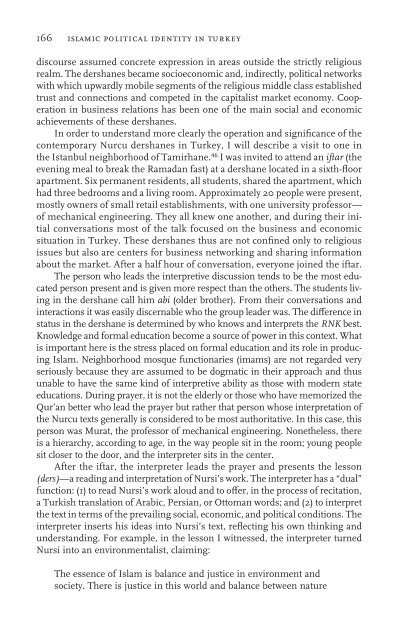Create successful ePaper yourself
Turn your PDF publications into a flip-book with our unique Google optimized e-Paper software.
166 islamic political identity <strong>in</strong> turkeydiscourse assumed concrete expression <strong>in</strong> areas outside the strictly religiousrealm. The dershanes became socioeconomic and, <strong>in</strong>directly, political networkswith which upwardly mobile segments of the religious middle class establishedtrust and connections and competed <strong>in</strong> the capitalist market economy. Cooperation<strong>in</strong> bus<strong>in</strong>ess relations has been one of the ma<strong>in</strong> social and economicachievements of these dershanes.In order to understand more clearly the operation and signiWcance of thecontemporary Nurcu dershanes <strong>in</strong> <strong>Turkey</strong>, I will describe a visit to one <strong>in</strong>the Istanbul neighborhood of Tamirhane. 46 I was <strong>in</strong>vited to attend an iftar (theeven<strong>in</strong>g meal to break the Ramadan fast) at a dershane located <strong>in</strong> a sixth-Xoorapartment. Six permanent residents, all students, shared the apartment, whichhad three bedrooms and a liv<strong>in</strong>g room. Approximately 20 people were present,mostly owners of small retail establishments, with one university professor—of mechanical eng<strong>in</strong>eer<strong>in</strong>g. They all knew one another, and dur<strong>in</strong>g their <strong>in</strong>itialconversations most of the talk focused on the bus<strong>in</strong>ess and economicsituation <strong>in</strong> <strong>Turkey</strong>. These dershanes thus are not conWned only to religiousissues but also are centers for bus<strong>in</strong>ess network<strong>in</strong>g and shar<strong>in</strong>g <strong>in</strong>formationabout the market. After a half hour of conversation, everyone jo<strong>in</strong>ed the iftar.The person who leads the <strong>in</strong>terpretive discussion tends to be the most educatedperson present and is given more respect than the others. The students liv<strong>in</strong>g<strong>in</strong> the dershane call him abi (older brother). From their conversations and<strong>in</strong>teractions it was easily discernable who the group leader was. The diVerence <strong>in</strong>status <strong>in</strong> the dershane is determ<strong>in</strong>ed by who knows and <strong>in</strong>terprets the RNK best.Knowledge and formal education become a source of power <strong>in</strong> this context. Whatis important here is the stress placed on formal education and its role <strong>in</strong> produc<strong>in</strong>gIslam. Neighborhood mosque functionaries (imams) are not regarded veryseriously because they are assumed to be dogmatic <strong>in</strong> their approach and thusunable to have the same k<strong>in</strong>d of <strong>in</strong>terpretive ability as those with modern stateeducations. Dur<strong>in</strong>g prayer, it is not the elderly or those who have memorized theQur’an better who lead the prayer but rather that person whose <strong>in</strong>terpretation ofthe Nurcu texts generally is considered to be most authoritative. In this case, thisperson was Murat, the professor of mechanical eng<strong>in</strong>eer<strong>in</strong>g. Nonetheless, thereis a hierarchy, accord<strong>in</strong>g to age, <strong>in</strong> the way people sit <strong>in</strong> the room; young peoplesit closer to the door, and the <strong>in</strong>terpreter sits <strong>in</strong> the center.After the iftar, the <strong>in</strong>terpreter leads the prayer and presents the lesson(ders)—a read<strong>in</strong>g and <strong>in</strong>terpretation of Nursi’s work. The <strong>in</strong>terpreter has a “dual”function: (1) to read Nursi’s work aloud and to oVer, <strong>in</strong> the process of recitation,a Turkish translation of Arabic, Persian, or Ottoman words; and (2) to <strong>in</strong>terpretthe text <strong>in</strong> terms of the prevail<strong>in</strong>g social, economic, and political conditions. The<strong>in</strong>terpreter <strong>in</strong>serts his ideas <strong>in</strong>to Nursi’s text, reXect<strong>in</strong>g his own th<strong>in</strong>k<strong>in</strong>g andunderstand<strong>in</strong>g. For example, <strong>in</strong> the lesson I witnessed, the <strong>in</strong>terpreter turnedNursi <strong>in</strong>to an environmentalist, claim<strong>in</strong>g:The essence of Islam is balance and justice <strong>in</strong> environment andsociety. There is justice <strong>in</strong> this world and balance between nature




